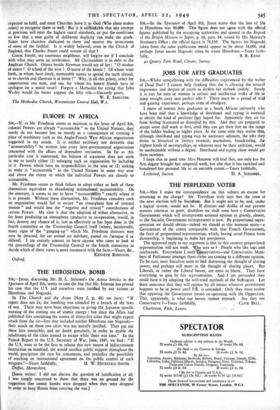THE HIROSHIMA BOMB
Snt,—Janus, discussing Mr. H. L. Stimson's On Active Service in the Spectator of April 8th, seems to take the line that Mr. Stimson has proved his case that the U.S. and ourselves were justified by our actions at Hiroshima . and Nagasaki.
In The. Church and the Atom (Note 2, D. 48) we have: " If report does not lie, the bombing was attended by a breach of the laws of war. There may have been objections to giving the Japanese specific warning ■of the coming use of atomic energy ; but since the Allies had published lists containing the names of thirty-five cities that might expect attack from the air—lists that included neither,letoshima nor Nagasaki— their attack on those two cities was not morally justified. They put out these lists ostensibly, and no doubt genuinely, in order to enable the .inhabitants of the cities named to escape while there was time." In the Franck Report to the U.S. Secretary of War, June, 1945, we find: "If the U.S. were to be the first to release this new means of indiscriminate destruction on mankind, she would sacrifice public support throughout the world, precipitate the race for armaments, and prejudice the possibility of reaching an international agreement on the public control of such
[Janus writes: I did not discuss the question of justification at all. I was simply concerned to show that there was no ground for the suggestion that atomic bombs were dropped when they were dropped in order to keep Russia from entering the war.]


































 Previous page
Previous page